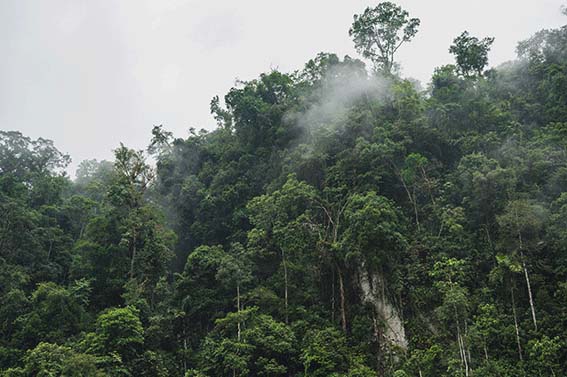Our solutions provide new additional income opportunities for agriculture-dependent rural communities, supporting Brazil's poverty reduction goals. But it doesn’t end there as we also help to mitigate climate change and promote biodiversity conservation by supporting Brazil’s efforts to become a leader in sustainable agriculture and waste-to-value systems and infrastructure, fostering industrial modernization. This industrial and social innovation makes companies and communities equally fit for the future.
Circular systems and decarbonization — reducing carbon footprints across operations—is one of the key strategies for companies aiming to become future-proof. Leveraging technologies and practices that reduce emissions, such as renewable energy sources and energy-efficient and clean processes, is crucial. The concept of decoupling emissions from economic growth underscores the feasibility of achieving economic expansion without escalating carbon emissions and environmental pollution.
Through collaboration with strategic partners in Brazil, we are advancing socio-ecological projects that position Brazil as a global leader in sustainable development.

Estimated revenue generated from circular economy transaction in 2022 and 2026 worldwide (in billion U.S. dollars)
© FSRE Industries
Kofi Atta Annan, a Ghanaian diplomat, served as the seventh Secretary-General of the United Nations from January 1997 to December 2006. Annan and the UN were co-recipients of the 2001 Nobel Peace Prize. He was also the founder and chairman of the Kofi Annan Foundation, and a founding member of The Elders, an international organization established by Nelson Mandela.
Annan's vision for sustainable development was clear: it is not merely a goal for individual nations or communities; it is a cause that transcends borders and touches every aspect of human existence. As he once said, "This cause … is the cause of all humanity." We are all interconnected, and the pursuit of sustainable development is essential for the well-being of our planet and future generations. It is a shared responsibility that requires collective action, cooperation, and commitment from all sectors of society and the industry to ensure a prosperous, equitable, and sustainable world for everyone.
Our innovative infrastructure projects are at the forefront of supporting Brazil’s compliance with key international agreements, such as the Paris Climate Accord and the United Nations Sustainable Development Goals (SDGs). By leveraging the scalability and groundbreaking potential of MWDP technology, we attract international support and establish Brazil as a central player in global sustainability initiatives and discussions.
Strengthening Brazil’s Global Position:
We are committed to enhancing Brazil’s reputation as a global exporter and a pioneer in sustainability. By adhering to international acceptance standards for agricultural products, our initiatives bolster Brazil’s standing in the global climate dialogue and strengthen its economic and environmental partnerships worldwide.
Economic Growth: Our projects utilize agricultural waste to improve resource efficiency, fostering sustainable economic expansion.
Amazon Protection: Through innovative and sustainable agricultural practices and technologies, we actively contribute to protecting the Amazon rainforest and preserving Brazil’s vital waterways.
By combining economic innovation with environmental responsibility, our work not only supports Brazil’s national interests and sustainable development objectives but also ensures a future where sustainability and economic growth go hand in hand.


Market disruption triggered a spike in prices for artificial fertilizer due to the corona pandemic and exacerbated by sanctions because of war on Ukraine that led to stockpiling by those able to afford fertilizers. Experts believe that prices will remain above pre-pandemic levels for a longer time to come. This horrendously high prices for artificial fertilizers on the open world market and the risk of supply bottlenecks and interruptions cause the prices of groceries and other products and semi-finished products to increase tremendously.
Our approach develops a seamless circuit of resources that offers a way to independence from overpriced and fluctuating world markets, therewith reduction in operating costs for companies. The in-house produced organic fertilizer among other things composed of bio-activated carbon produced by the microwave technology of one of our client we promote globally, is, among other things, excellently suited for the sugar cane and sugar and ethanol companies in Brazil. Due to the in-house production of this product, it is always available and provides a very lucrative profit margin because of the reduction in operating costs and high demand on the open market.
We must rethink the usage of biomass and find completely different ways of utilizing it than burning, dumping, or ploughing under, as it is often the case at present, and thereby emitting additional CO2 into our atmosphere. Growing international environmental concerns and awareness have resulted in stringent emissions regulations. This in turn has encouraged industries to invest in technology developments and advanced concepts for the use of biomass such as in form of the Microwave Depolymerisation technology like the one of our client and its main product, the bio-activated carbon, which can be used in many different applications.



Contaminated water is a major problem in many countries around the world. In Brazil, many households use water filters to make tap water drinkable. Our bio-activated carbon does not contain any soluble substances and therefore the quality of the drinking water in the household can be guaranteed. In addition, the cleanliness of the breathing air in closed rooms is a challenge in many countries, especially in the 3rd world. Dust particles are responsible for the premature death of people in many parts of the world as these dust particles lead to respiratory diseases.
Whether clean drinking water or good air, our material cycle concepts and the products of the Microwave-assisted Catalytic Depolymerization Process (MWDP) ensure a cheap supply of filter systems for daily use for a healthy and good life.


Protected by Copyright. Reprint or publication, also through electronic media, even in parts only after official approval in written. Some data is the property of the respective author.
This website, text and data provides general information. FSRE assumes no liability for the information given being complete or correct. Due to varying update cycles, statistics can display more up-to-date data than referenced in the text. Some data is the property of the respective author. All product and company names are trademarks™ or registered® trademarks of their respective holders. Use of them does not imply any affiliation with or endorsement by them.
Sources:
Evaporation causes Europe to dry out Spektrum
Guest Authors (2018) - “Shrink emissions, not the economy” Published online at Our World In Data
Lassaletta, Billen, Grizzetti, Anglade & Garnier (2014). 50 year trends in nitrogen use efficiency of world cropping systems: the relationship between yield and nitrogen input to cropland. Environmental Research Letters. – processed by Our World In Data